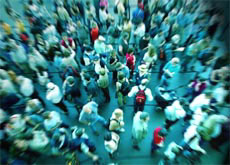
Number of foreigners set to fall

New laws on naturalisation are expected to lead to a reduction in Switzerland's foreign population.
This week the Swiss Senate approved government proposals to grant automatic Swiss citizenship to third-generation foreigners.
A study by Avenir Suisse, a think-tank for economic and social issues, says the proposals, if they become law, will reduce Switzerland’s foreign population by around one third over the next four decades.
This is despite the fact that immigration to Switzerland is likely to increase over the same time period.
Just over 20 per cent of Switzerland’s population is foreign, but at least one quarter of these, or around 440,000, are second or third-generation immigrants.
The study found that granting these people Swiss citizenship would reduce the percentage of foreigners in Switzerland to around 14 per cent of the population by the year 2050.
Rightwing resistance
Ironically, the proposals on naturalisation are being opposed by the rightwing Swiss People’s Party, which would also like to reduce the number of foreigners in Switzerland.
The People’s Party believes that making Swiss citizenship easier to obtain is not the best way to promote integration.
However, Switzerland’s current laws on citizenship are among the strictest in Europe. A foreign resident is typically required to live here for at least 12 years before they can apply for citizenship.
Approval of citizenship is left to local communities, where in recent years applications from people from Balkan countries have regularly been turned down.
And a Swiss passport costs money: town councils can charge up to three months’ salary for the privilege of becoming Swiss.
Citizenship
By relaxing the laws on citizenship, the government hopes long-term residents and those born in Switzerland will think more seriously about becoming Swiss.
The Avenir Suisse study indicates that this will indeed be the case.
As well as granting automatic citizenship to third-generation foreigners, the new law on naturalisation would reduce the required length of residence from 12 to eight years.
The largest immigrant community in Switzerland comes from Italy, with Serbia and Montenegro in second place.
But over the next few years the number of immigrants coming from Germany, Portugal and Sri Lanka is set to increase, while those coming from Italy will decline.
The proposed changes to the citizenship law would mean modifying the
constitution, and therefore a compulsory nationwide vote on the issue.
When the Swiss voted on the easing of naturalisation for young immigrants in 1994, it was rejected.
swissinfo with agencies
Around 20 per cent of Switzerland’s population is foreign, 440,000 are second or third generation.
The new law on naturalisation would grant automatic citizenship to third generation foreigners, and reduce the required length of residence in Switzerland from 12 to eight years.
The proposals have been approved by the Swiss Senate, but are being opposed by the right-wing Swiss People’s Party.

In compliance with the JTI standards
More: SWI swissinfo.ch certified by the Journalism Trust Initiative

























You can find an overview of ongoing debates with our journalists here . Please join us!
If you want to start a conversation about a topic raised in this article or want to report factual errors, email us at english@swissinfo.ch.